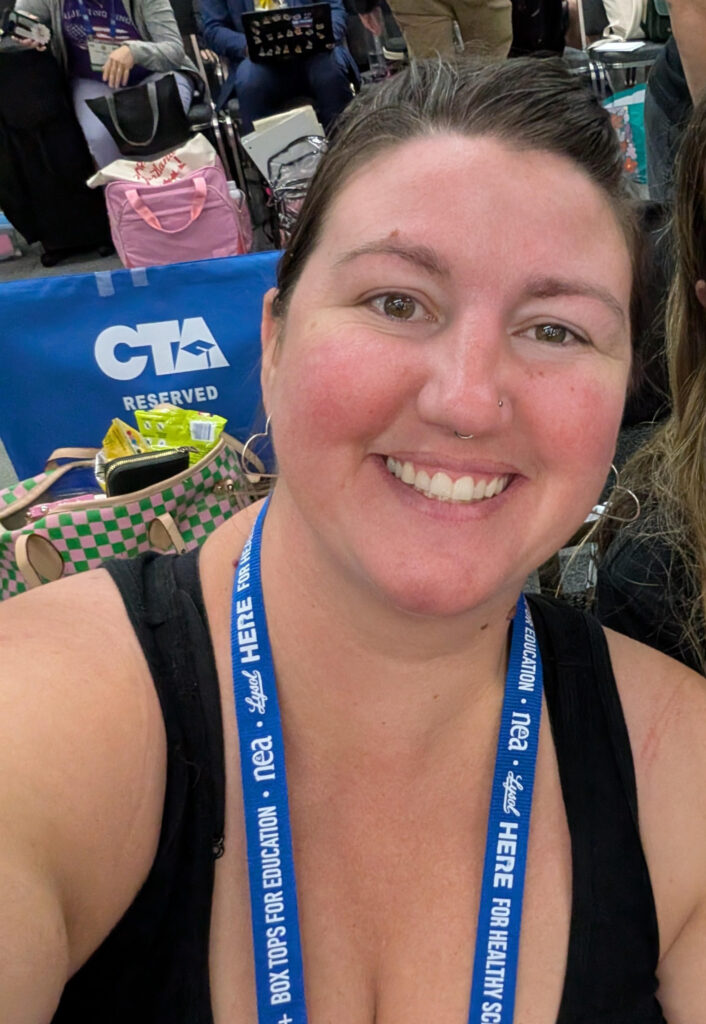This year’s National Education Association (NEA) Representative Assembly (RA) was in Portland, Oregon and it was one for the books. Imagine the UESF General Assembly meeting, but with 7000 delegates from every state across the country. The NEA, for those who don’t know, is the parent affiliate of CTA, whereas the AFT is the parent of CFT. I say that this was my 1.5th RA, because last year the NEA Staff went on Strike on the second day of the RA, and the rest of the RA was cancelled. So while this may have been the second time I went to registration and got my badge and got to vote on some new business items, it was the first time I got to see beyond the first day, and see the RA til the end. The RA is an annual meeting, one that people tout as the “largest democratic deliberative body in the world” because it brings together so many people and we vote on various items of business, called New Business Items (NBI’s). We also voted on some amendments to legislation and bylaws. There are of course other pieces of business to cover, people to hear from, and of course lots of fun to be had. As soon as you walk into the convention center, you see all of the latest etsy educator t-shirts and accessories, aspiring educators to retired educators, and every person there pumped up to fight for public education. After all, we are all educators deciding to spend about a week of our summer together at this meeting.
The night before the official RA begins, there is a beautiful event put on called the Human and Civil Rights Awards Dinner. UESF was able to attend this, and it was truly inspiring and a fantastic way to kick off this week. During the dinner, we heard from NEA leaders and about individuals and groups doing truly inspiring work around the country. To read more about who won, please click here. Especially as Public Education is under attack, and even recognizing the contributions of the global majority [minorities] are being stifled, these moments are more important than ever to come together and witness the good being done, the resilience, and to recognize and honor leaders and change makers.
First thing every morning, however, the days start out meeting with your state, and California alone brings about 1000 delegates. So at 7 am (yes, 7 am), we all gather in a ballroom of a hotel to review the new business items together and debate whether to support or oppose the new business item as a caucus. While each delegate is free to vote however they choose on the floor, we still vote as a caucus and then while on the floor, people remind us which way the caucus voted. And sometimes, hearing the debate amongst ourselves does help everybody understand the NBI and help us form an opinion. For example, there was an NBI about promoting cursive handwriting. Hearing people debate whether that was an important thing or not taught me things about the value of cursive writing I hadn’t known before.
This year, there were 93 NBI’s to vote on, which are labeled as a number (i.e. New Business Item 26, NBI 45, etc…). The NBI’s are numbered as they come in. Historically, the NBI’s are debated as a caucus and as a whole delegation in that order. However this year, NEA President Becky Pringle, introduced a new way of handling NBI’s which was to group them by theme and create 6 “Thematic Buckets” – such as Elevating the Professions and Advancing Student Learning, Growing our Union, and Promoting Peace. The buckets were then considered in order of alignment with NEA’s Vision, Mission, and Values. This was proposed in addition to increasing the time during each session spent deliberating the NBI’s. This was the first big moment of debate. Many folks did not want to see this change as it felt unfair to the “first come, first deliberated” history that many were accustomed to. Many likened it to being analogous to seniority within our unions. However, President Pringle pointed out that this proposal came in response to hearing from many people over the years that sometimes we’re jumping around topics too much and that it would be nice to hear similar proposals near each other. She also proposed increasing time deliberating on NBI’s because it was rare to get through all of the NBI’s during the RA. After some debate, the delegates voted to approve President Pringle’s proposal.
Because this was my 1.5th RA, I had a lot to learn, so I was asking questions of experienced delegates to try and make sure I understood. One thing I appreciated immediately, though, was UESF’s exercise of Robert’s Rules because that was one thing I didn’t feel like I needed to learn on the floor. But some things I did learn: NBI’s are really just 1-year mandates on what the NEA should focus on/do for the next year, they are funded through the contingency fund of the entire NEA budget (yes, the entire thing), there is a formula for how they cost things out and wording matters, there is a strategy for how to move your NBI in a room of 7000 people with over 20 microphones on the floor – it is a beautiful dance to watch, and while often predictable, it is not always predictable which ways NBI’s will be voted on or which NBI’s will have rigorous debate. Sometimes an NBI that has rigorous debate in the state caucus will have none on the delegation floor, and vice versa. This year’s RA had a few NBI’s that touch on political topics, including one that became viral. I’ll get to that shortly.
So how does one get an NBI to the RA? I can’t speak in detail about this as I haven’t witnessed the entire process, but there are folks in UESF that can speak to this. From what I gathered, there is a whole process to get the NBI to the floor, and the NEA does provide a lot of support to get them there. But essentially, any individual can write one to bring forth. There does need to be a minimum amount of signatures/support, but the threshold to bring to the floor is much lower than what I have heard is required of bringing something to the floor of the AFT, for example. This brought one of the first contradictions I experienced. Because it is highly democratic to allow for any person to bring any item they’d like the organization to focus on, and in a way that is great. However, there can then be items that people bring for the sole purpose of making a point, which can be frustrating when you consider the time, money, and resources that go into this huge event. It left me wondering: what is the right level of vetting and how democratic are those processes to bring items to the floor? Is this the best way?
And what are the topics brought as NBI’s, given that they’re a 1-year mandate? Well there is such a range – part of what was seen in those thematic buckets. Some had to do with NEA operations, such as providing paddles that are green on one side, red on the other, for delegates to use when voting (right now we vote with just an “Ay” or “No”). Some were about supporting states that are particularly under attack from their state governments trying to erode public education. There were NBI’s on AI, recognizing the history of the American Teachers Association, and publishing toolkits for various things. A lot of the common debate points centered around the cost of the NBI, whether this was a national or state issue, whether this was something that should only be focused on for a year or ongoing, whether that resource was already readily available or not, etc…
The NBI that got the most news attention afterward was NBI 39, which called on the NEA to not use, endorse, or publicize any materials, programs, or professional development offerings from the Anti-Defamation League (ADL). This NBI was hotly debated both in the state caucus and on the delegation floor of the RA. We were told on the floor that while this NBI does not use the word boycott, that is how legal is interpreting it’s implementation, and therefore if it does pass it would move to the executive committee to be voted on as that is the current policy for all boycott proposals. If the executive committee then votes to support, it will move through a couple of more steps before being brought back to the RA floor the next year. So we knew before debate had even started, that if it passed, the earliest it could possibly be implemented would be a year out. The author of the NBI expressed surprise that it would be deemed a boycott, and still wanted to move forward with it. Many think of the ADL as synonymous with fighting antisemitism. However, this NBI was written by a Jewish educator who sees the ADL as a danger to antisemitism because of it’s history with suppressing anti-racist organizing, including recently any sentiments in opposition to Israel and pro-Palestine. There is a history with the ADL suppressing these movements, including right here in San Francisco, the anti-Apartheid movement in South Africa, as well as against the movement for Black Lives. The ADL over the past nearly 21 months has published things that have falsely labeled educators antisemitic and led to educators being doxxed. We heard from people opposed to this NBI that while the current ADL leadership may be problematic, the ADL is important to the Jewish community and has a lot of incredible resources for teaching about the Holocaust. To that, educators recognized that and also stated that there are many valuable resources that teach about the Holocaust and fight antisemitism that aren’t targeting educators and our union siblings and suppressing antiracist organizing. People were asking questions such as, if this passes, how much more of a target could the NEA become to this current administration. Ultimately, when it came time to vote, this business item passed. Hearing from experienced delegates, it was momentous to even hear the word Palestine be uttered. Some people couldn’t bring themselves to name the country, but many could, and it was cheered. There were people of Jewish, Christian, Muslim, and no religion standing in solidarity against the way our tax dollars are not fully funding our schools but are instead funding war against the Palestinian people. And they understood the connection that the ADL has with our police force, ICE, and ongoing funding to Israel. Educators want our schools to be funded, they want our union siblings to be safe and free to engage in debate without fear of being doxxed, and overall want to move towards a world where our students can hope for tomorrow. You could feel that this was a moment of tides shifting, one that wouldn’t have happened even 3 years ago. We then moved on to the last of our NBI’s and were able to get through all NBI’s by the last day.
By the next day, however, multiple of the educators who spoke out in support of this NBI were doxxed. And while the RA is supposed to be a closed meeting, much like our general assembly meetings, which means not putting out names and quotes, some people did violate that rule and put some of our union siblings in harm’s way. Additionally, we started to see many of the headlines go out about the NEA voting to drop the ADL. While many organizations celebrated this, there were obviously some that didn’t. One thing that was missed in many of the headlines, was that yes it was voted in favor of and the vote was in favor of moving it to the executive committee. That is in no way to diminish the victory of passing this NBI, because the bell cannot be unrung that people are doing more homework about which organizations take which stands more broadly and not just on one topic. However, in many ways it also set up an intense week of the ADL campaigning against the NBI and it lost nuance of people not understanding that the NBI was still at risk of not going through. Within 2 weeks of the RA ending, the executive committee met and voted to not move further with this NBI. Many are understandably very upset that this feels like the few at the top going against the very recent mandate of the delegation which voted in majority to drop the ADL. How can we say we’re the largest democratic deliberating body when a vote in the affirmative gets halted so quickly and without what feels like enough time to truly gather more information. President Pringle put out a statement that tries to explain their decision, and calls on the ADL to support free speech of all students and educators, and to not attack our union siblings. So now I’m left wondering how we as the NEA will hold the ADL accountable to that. When our unions, free speech, public education, and rights are under attack with the Right Wing Billionaire Agenda we have running this country – how do we make sure we’re uplifting, promoting, and collaborating with organizations that stand strong with all of us and not just some of us? I’m also left wondering if the structures within the NEA allow for the most democratic process? There is still so much to learn and understand as a participant and delegate in the NEA-RA and I hope to have the opportunity to attend again.
If you want to learn more about the history of the ADL, more about what it’s like to be a delegate at the RA, or want to organize to strengthen our union, feel free to reach out to me via ask-uesf@uesf.org.
In solidarity,
Maggie




